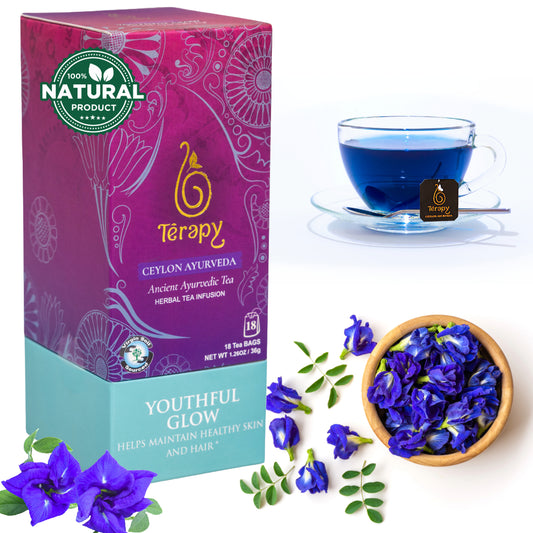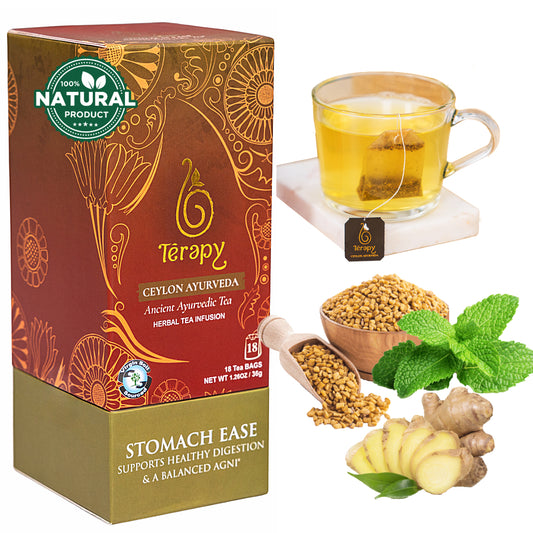Ashwagandha: The Powerhouse Herb of Ayurveda for Health and Wellness
 Ashwagandha (Withania somnifera), also known as Indian ginseng or winter cherry, is a revered herb in Ayurvedic medicine. For centuries, it has been used to promote vitality, enhance physical and mental resilience, and support overall well-being. Ashwagandha is classified as an adaptogen, meaning it helps the body adapt to stress and maintain balance. In this article, we will explore the wide-ranging health benefits of ashwagandha, its role in Ayurveda, and how to incorporate it into your daily routine for optimal health.
Ashwagandha (Withania somnifera), also known as Indian ginseng or winter cherry, is a revered herb in Ayurvedic medicine. For centuries, it has been used to promote vitality, enhance physical and mental resilience, and support overall well-being. Ashwagandha is classified as an adaptogen, meaning it helps the body adapt to stress and maintain balance. In this article, we will explore the wide-ranging health benefits of ashwagandha, its role in Ayurveda, and how to incorporate it into your daily routine for optimal health.
Health Benefits of Ashwagandha
Ashwagandha is packed with bioactive compounds, including withanolides, alkaloids, and flavonoids, which contribute to its therapeutic properties. Some of the key health benefits of ashwagandha include:
1. Stress Reduction and Anxiety Relief
One of ashwagandha’s most celebrated benefits is its ability to reduce stress and anxiety. As an adaptogen, it helps the body cope with physical and mental stress by balancing cortisol levels. Cortisol, often referred to as the "stress hormone," is released by the adrenal glands during times of stress. Chronic stress leads to elevated cortisol levels, which can have negative effects on health, including weight gain, anxiety, and poor sleep. Ashwagandha helps regulate cortisol levels, leading to reduced stress and a calmer mind.
2. Boosts Energy and Stamina
Ashwagandha is known to increase energy levels and physical endurance. It helps improve the body’s ability to handle physical exertion by enhancing mitochondrial function, which boosts stamina and vitality. Athletes and active individuals often use ashwagandha to improve their performance, reduce fatigue, and speed up recovery after intense workouts. It also helps reduce muscle weakness and support overall strength.
3. Supports Cognitive Function and Memory
Ashwagandha has neuroprotective properties, which means it helps protect the brain and supports cognitive function. Research suggests that ashwagandha may improve memory, focus, and mental clarity by enhancing the communication between brain cells. It has been shown to improve the function of the hippocampus, the part of the brain responsible for memory and learning. Regular use of ashwagandha may also reduce the risk of cognitive decline as we age.
4. Immune System Support
Ashwagandha plays a significant role in strengthening the immune system. It has antioxidant properties, which help combat oxidative stress and protect cells from damage. Additionally, ashwagandha has immunomodulatory effects, meaning it can regulate and enhance the body’s immune response. It supports the production of white blood cells, which help the body fight infections and diseases.
5. Hormonal Balance
Ashwagandha is particularly beneficial for balancing hormones, especially in men. It has been shown to improve testosterone levels, enhance fertility, and support reproductive health. In women, ashwagandha helps regulate menstrual cycles and alleviate symptoms of PMS and menopause. Its adaptogenic properties help balance the endocrine system, promoting overall hormonal equilibrium.
6. Reduces Inflammation
Ashwagandha has potent anti-inflammatory properties that help reduce inflammation in the body. Chronic inflammation is linked to a variety of health conditions, including arthritis, heart disease, and autoimmune disorders. By reducing inflammation, ashwagandha can promote joint health, reduce pain, and support overall well-being.
Ashwagandha in Ayurveda

In Ayurveda, ashwagandha is considered a Rasayana herb, which means it is a rejuvenating tonic that promotes longevity and vitality. It is classified as a Vata and Kapha balancing herb, as it helps to calm the Vata dosha (associated with air and space, which can lead to anxiety and dryness) and reduce excess Kapha dosha (associated with earth and water, which can cause sluggishness and congestion).
Ashwagandha is also considered a Sattvic herb in Ayurveda, meaning it enhances clarity, wisdom, and calmness. Its balancing properties make it useful for individuals experiencing stress, fatigue, or mental exhaustion. Ashwagandha is often recommended to restore balance in individuals with high Vata or Kapha imbalances, such as those with chronic fatigue, anxiety, and low energy.
Ayurvedic Uses of Ashwagandha
In Ayurvedic medicine, ashwagandha is used in various forms, including powders, tablets, oils, and decoctions. It is often combined with other herbs to enhance its effectiveness. Here are some of the common ways ashwagandha is used in Ayurveda:
1. Ashwagandha Powder (Churna)
Ashwagandha powder is one of the most popular forms of this herb in Ayurveda. It can be mixed with warm milk or water and consumed as a daily tonic to rejuvenate the body and mind. When combined with honey, it is considered an excellent remedy for stress, fatigue, and sleep disturbances. Ashwagandha churna is also commonly used in Ayurvedic formulations designed to support the immune system and promote vitality.
2. Ashwagandha Milk (Ashwagandha With Milk)
In Ayurveda, one of the most traditional ways to consume ashwagandha is by mixing its powder with warm milk. Ashwagandha milk is particularly effective for enhancing vitality and calming the nervous system. This combination is recommended for individuals experiencing stress, insomnia, or general weakness. Milk acts as a carrier, helping to nourish the body and enhance the absorption of ashwagandha’s healing properties.
3. Ashwagandha Oil for Massage
Ashwagandha oil is used in Ayurvedic massage therapies, especially in Abhyanga, the practice of self-massage with warm herbal oils. Massaging the body with ashwagandha oil helps reduce stress, relax muscles, and promote circulation. It is also beneficial for soothing joint pain and reducing inflammation.
4. Ashwagandha Tablets or Capsules
Ashwagandha is available in tablet or capsule form, making it easy to consume as a supplement. These convenient forms are often used to support energy levels, improve mental clarity, and reduce stress. Capsules typically contain a concentrated dose of the herb, making it an effective option for people who prefer a more standardized dose.
5. Ashwagandha Decoction
In Ayurvedic medicine, a decoction made by boiling ashwagandha root in water can be consumed to treat various ailments, such as digestive issues, fatigue, and respiratory conditions. This preparation is also believed to improve overall vitality and support the body’s natural healing processes.
Methods to Digest Ashwagandha
There are several ways to digest ashwagandha, depending on your preferences and the form you choose to use. Below are some common methods of consuming ashwagandha:
1. Ashwagandha with Milk or Water
The most traditional and popular method is to mix ashwagandha powder with warm milk or water. For a simple dose, mix 1/2 to 1 teaspoon of ashwagandha powder in a cup of warm milk or water and drink it once or twice a day. This helps the body absorb the herb's nutrients effectively while providing calming effects on the nervous system.
2. Ashwagandha in Smoothies
To incorporate ashwagandha into your daily routine, add 1/2 teaspoon of ashwagandha powder into your morning smoothie. Combine it with fruits like bananas, berries, or mangoes, and add other nourishing ingredients such as almond milk or coconut water for a nutritious and energizing drink.
3. Ashwagandha Tea
You can also prepare ashwagandha tea by boiling a small amount of ashwagandha root or powder in water and drinking it as a herbal tea. To enhance the flavor, add honey, ginger, or lemon, which will also complement ashwagandha’s stress-reducing properties.
4. Ashwagandha Capsules or Tablets
For a more convenient option, you can take ashwagandha in capsule or tablet form. Follow the dosage instructions on the supplement bottle or as recommended by a healthcare provider. This method is ideal for individuals who need a precise and convenient way to incorporate ashwagandha into their daily regimen.
5. Ashwagandha with Ghee and Honey
In Ayurveda, combining ashwagandha with ghee and honey is considered an ideal way to enhance its rejuvenating effects. Ghee helps nourish the body and mind, while honey adds sweetness and supports the herb’s therapeutic properties. Take this mixture daily to promote vitality, strength, and hormonal balance.
Conclusion
Ashwagandha is an incredible herb that offers a wide range of health benefits, from reducing stress and anxiety to enhancing energy, cognition, and immune function. In Ayurveda, it is considered a powerful adaptogen that helps restore balance in the body and mind. Whether taken as a powder, in milk, or as a supplement, ashwagandha can be easily incorporated into your daily routine for optimal health and well-being. Always consult with an Ayurvedic practitioner or healthcare provider before adding new herbs or supplements to your regimen to ensure it is appropriate for your individual health needs.
Featured collection
-

Youthful Glow Tea
SaleYouthful Glow Tea
Regular price From $17.99Regular priceUnit price / per$19.99Sale price From $17.99Sale -

Slimming Garcinia Tea
SaleSlimming Garcinia Tea
Regular price From $17.99Regular priceUnit price / per$19.99Sale price From $17.99Sale -

Joint Ease Tea
SaleJoint Ease Tea
Regular price From $14.99Regular priceUnit price / per$17.99Sale price From $14.99Sale -

Stomach Ease Tea
SaleStomach Ease Tea
Regular price From $15.99Regular priceUnit price / per$17.99Sale price From $15.99Sale





